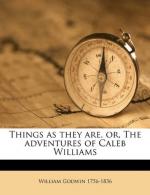|
This section contains 9,696 words (approx. 33 pages at 300 words per page) |

|
SOURCE: Handwerk, Gary. “Of Caleb's Guilt and Godwin's Truth: Ideology and Ethics in Caleb Williams.” ELH 60, no. 4 (winter 1993): 939-60.
In the following essay, Handwerk studies the relationship between Godwin's novel and his political treatise, Enquiry Concerning Political Justice.
For a moralizing solution, like any essentializing gesture, serves the ideological function of masking the more difficult cultural and ethicopolitical issues.
—Dominick LaCapra, History, Politics, and the Novel
I
Despite a recent resurgence of interest in his life and in certain of his works, William Godwin remains an elusive and little-noticed figure of English literary and intellectual history. Known as much for his personal links to other figures—to Wollstonecraft, Wordsworth, or Shelley—as for his own writing, Godwin remains largely unread except by specialists in the Jacobin period. At best, other critics may identify Godwin with the eccentric anarchism of his Enquiry Concerning Political Justice or the Gothic histrionics...
|
This section contains 9,696 words (approx. 33 pages at 300 words per page) |

|


